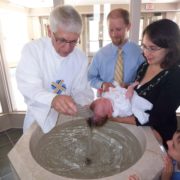When Perceived Disaster Strikes
When Perceived Disaster Strikes
In these last couple of posts I’ve been using stories from preachers to illustrate what to do when things go wrong. We’ve looked at what to do with a major mistake in your sermon, as well as what to do if communion goes badly. Today I want to illustrate something that goes very badly wrong, so badly that some will consider that sin has taken place. When perceived disaster strikes in worship, how do you handle it?
The Background
I was traveling in Turkey with a group of pastors, learning about the biblical historic sites in that country. In our group there were two Catholic priests. I was particularly drawn to one of them. When I asked him about his life and faith story, he said it went back to world war II. He was an undercover spy in a monastery in Italy. His job was to observe the Nazi armies, and then report to the Allies about troop movements. He grew up Baptist in belief and practice, but was so impressed with the monks and their commitment to living what they believed, that he converted after the war.
Eventually, over dinner one night, I asked him the question: What’s the funniest thing that’s ever happened to you in ministry? He told me a baptism story. In the Catholic tradition, baptism of an infant is very important. That act of baptizing a child cleanses that child from the power of original sin, they believe. I remembered my wife’s work as a nurse in a Catholic hospital many years prior. She had received some training in baptizing a child that was likely to die and there was no priest available. Baptism is that important.
The Disaster
When a child is baptized in the Catholic tradition, there is a ceremony in which a parent brings the child close to  the priest, who pours holy (or blessed) water over the child’s head as he says the words of initiation: “I baptize you in the name of the Father, and of the Son, and of the Holy Spirit.” Here is a description of the importance of baptism to the Roman Catholics.
the priest, who pours holy (or blessed) water over the child’s head as he says the words of initiation: “I baptize you in the name of the Father, and of the Son, and of the Holy Spirit.” Here is a description of the importance of baptism to the Roman Catholics.
Well, my friend had several baptisms scheduled that morning, but they all came suddenly to a halt. A lovely family came in with a candidate for baptism in the mother’s arms. Just as the mother was placing the child over the baptismal font, the baby had a blowout diaper. Any of you parents know what that’s like. A child has diarrhea, and all of a sudden a blast of gas results in excrement all over. That’s what happened here. It got on the mother, on the priest, but worst of all, in the baptismal font, ruining the holy water. Remember, the water is holy–therefore, this is a disaster.
What To Do Now?
So what did my friend do? He quieted the parents, who were very upset. They felt that their child might be  doomed because of this. He assured them over and over that he would take care of it, and that God would understand. And so, he cleaned up everything, changed his vestments, and went back to baptizing. Later, the parents came back and the baptism was successfully administered.
doomed because of this. He assured them over and over that he would take care of it, and that God would understand. And so, he cleaned up everything, changed his vestments, and went back to baptizing. Later, the parents came back and the baptism was successfully administered.
What About You?
What is holy in your tradition? The word “holy” simply means that something is separate, different, set apart for religious purposes. If people consider something holy, it can lead to perceived disaster. When perceived disaster strikes in a worship service, how do you handle it?
I think of a similar thing that happened in my own tradition. The pastor wanted to illustrate trust. So, he invited a child to come up to the front of the sanctuary with him, set the child up on the communion table, and encouraged the child to jump to him. The act of putting the child on the communion table crossed a line for some in the congregation. That table is “holy” to many people, and so, this was a time when perceived disaster strikes for a church. This pastor almost lost his job over his illustration.
What Do You Do When Perceived Disaster Strikes?
You do what my friend, the priest did. You encourage people that this isn’t the end of the world. This, too, will be taken care of. Then you do the things necessary to clean up the mess, reminding people that God is a good and gracious God, full of mercy.
This won’t be good enough for some people, but for most, it will put things into perspective.
I don’t want to make fun of my Catholic friends, but here’s another disaster at a wedding, when the priest drops the host.




Leave a Reply
Want to join the discussion?Feel free to contribute!